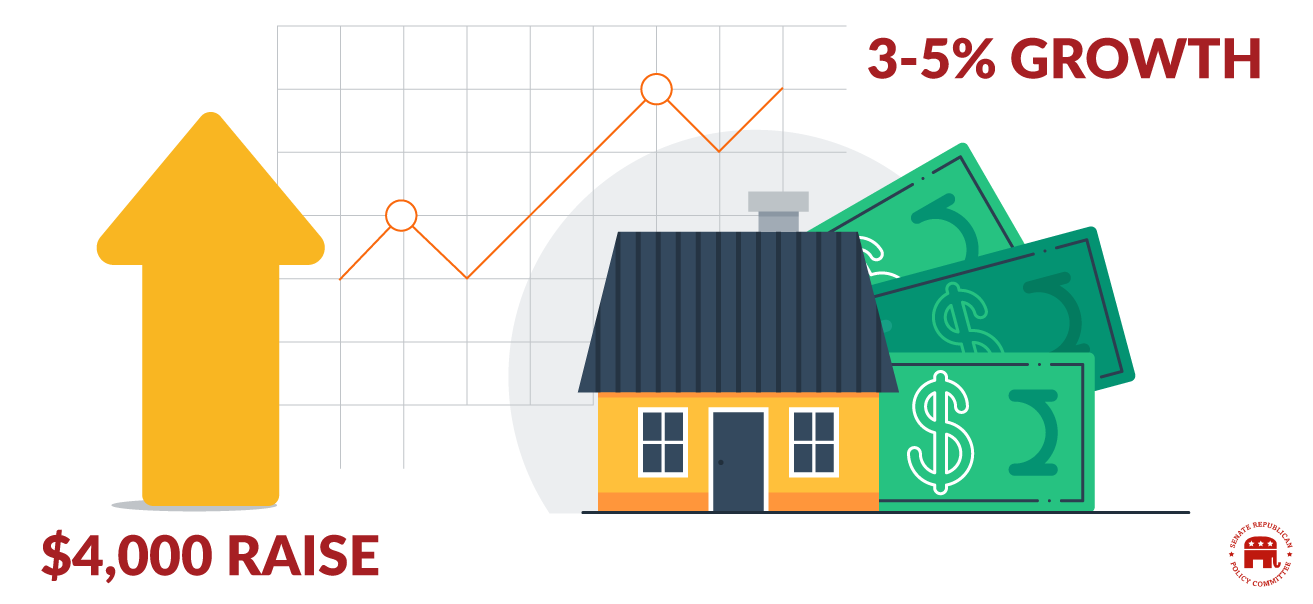How Tax Cuts Help Americans
- Republican tax cuts will help American families, businesses, and the economy by lowering rates, simplifying the system, and eliminating special interest loopholes.
- All taxpayers will have more reason to take the standard deduction to simplify their taxes.
- Workers’ paychecks will rise, small business owners will see their top rate cut, and international businesses will have incentive to bring billions of dollars back to America.
Tax cuts will let Americans keep more of their hard-earned money and encourage businesses to invest in jobs. This paper outlines how reforms proposed in the framework drafted by the Senate, the House, and President Trump will help Americans.
Households get $4,000 Raise, Economy 3-5% Larger

Help Individuals and Working Families
The proposal: Roughly double the standard deduction to $24,000 for joint filers and $12,000 for single filers.
The facts: Approximately two-thirds of taxpayers take the existing standard deduction. A larger deduction would lower taxes for these people. It would also cause many more taxpayers to use the larger standard deduction because it would lower their taxes compared to itemizing, and it would simplify the tax filing process for them. American families and businesses spend 6 billion hours per year complying with the tax code, at a cost of $263 billion.
Help Small Businesses
The proposal: Set the maximum rate for pass-through businesses at 25 percent.
The facts: Pass-through businesses are sole proprietorships, partnerships, or “S corporations,” which are organized under subchapter S of chapter 1 of the Internal Revenue Code. They “pass through” their profits to their owners without a tax at the business level – the tax is then paid at the individual level. Pass-through businesses employ more workers than large companies organized as “C corporations,” and the businesses earn more combined income. They also face very high marginal tax rates: up to nearly 40 percent at the federal level and 47 percent once average state and local taxes are added. When we cut the federal pass-through tax rate to 25 percent, we help these businesses compete and create jobs.
Help Workers
The proposal: Reduce the corporate tax rate from 35 to 20 percent.
The facts: Workers bear most of the burden of the corporate tax. This is because the corporate tax results in lower wages and fewer benefits. Consumers also pay higher prices as the cost of the business’s taxes are passed along. When the federal corporate tax rate drops to 20 percent, the average American household will see $4,000 in additional income. Wages will increase between 4 percent and 7 percent.
Help Job Creation and the economy
The proposal: Lower tax rates on all types of businesses and move to a territorial tax system.
The facts: America has the highest corporate tax rate in the developed world. This hurts American jobs. From 2004 to 2016, if the corporate tax rate were 20 percent, U.S. firms would have bought $1,205 billion in business assets in the mergers and acquisitions market. The actual result of our 35 percent tax rate was that U.S. business assets were acquired by foreign firms to the tune of $510 billion.
When we lower the corporate tax rate and move to a territorial system, domestic and foreign companies will be incentivized to invest in America. Top economists predict that once these changes are made the U.S. economy will be 3-5 percent larger.
It’s Time to Get to Work
As Congress considers tax relief legislation, Democrats will complain that the process has been rushed. This couldn’t be further from the truth. Republicans and Democrats both know how necessary tax reform is. To that end, the following are just some of the steps the Finance Committee has taken to examine tax reform and lay the groundwork for the time when the policy environment would be ready.
- Hearings: 70 hearings over six years examining how the tax code should be improved.
- Research: 10 papers laying out options for how to reform the tax code.
- Working groups: 5 bipartisan working groups examining various aspects of the tax code. These groups produced reports outlining the choices to be made in tax reform.
Next Article Previous Article
